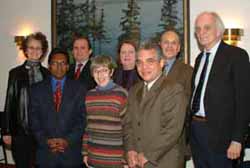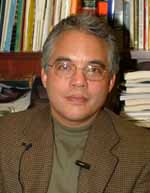TC, UNICEF and the Afghan Government Propose a National Academy of Education in Kabul
In a world torn by war and disarray, Afghanistan stands out among countries least able to deal with the challenges of the 21st Century. Though the repressive Taliban regime has been defeated on the battlefield, its forces and those of local warlords make for instability. The Afghan Government, however, intends to build a modern nation-state and has set its sites on education as it salvation.
In 2002 there was a significant increase in the number of children attending school-over 3 million children returned to school and in comparison to pre-2002 levels, a large number were girls (29 percent). "On a global scale," as Najmuddin Saqib, Assistant to the Afghan Minister of Education said, this can only be classified as a massive achievement in increasing enrollment." However, in some parts of the country-particularly the southern provinces-low enrollments are recorded, especially among girls.
After a three-day visit to the College in early March by a delegation from the United Nations Children's Fund (UNICEF) consisting of Waheed Hassan, the U.N Education Program Secretariat for Afghanistan, Richard Navarro, UNICEF's Education Program Consultant and a representative from the Afghan government, Najmuddin Saqib, representing the Afghan Ministry of Education and its Minister Mohammmed Yunis Qanooni, Teachers College has been called on once again in its history to support curriculum development, teacher training and systemic educational reform.
From 1953-1978, until the Soviet invasion and civil war, Teachers College played a pivotal role in the publication of elementary and secondary textbooks and worked to improve teaching and learning for both students and teachers of Afghanistan.
The new TC Afghan Project team, which has been working on the genesis of another cooperative effort with Afghanistan for more than year, cooperated with its new partners to hammer out a proposed "letter of intent" for wide-ranging efforts in teacher education in Afghanistan. The TC team is made up of four faculty members and one administrator. They are: Clifford A. Hill, Arthur I. Gates Emeritus Professor of Language and Education; Jane Monroe, Associate Professor of Statistics and Education; Nancy Lesko, Professor of Education; Ruth Vinz, Enid and Lester Morse Chair in Teacher Education; and Barry Rosen, Executive Director of External Affairs.
In its latest incarnation, Teachers College will work with the Afghan Ministry of Education and UNICEF in establishing a National Academy of Education, to be located in Kabul, to promote educational excellence in Afghanistan. According to the proposed letter of intent, "The National Academy will serve as a focal point engaging the international community, particularly UNICEF and TCCU (Teachers College, Columbia University) the [Afghan] government and civil society in developing the educational system."
The proposed letter of intent is in draft form and the College's trustees, UNICEF, and the Ministry of Education in Afghanistan are in the process of reviewing the document.
In an exclusive interview with Richard Navarro, the UNICEF educator spoke about the challenges facing Afghanistan and the role of UNICEF, the Afghan Ministry of Education and Teachers College. "In its nation-building effort," Navarro said, "Afghanistan wants to create a country that includes all citizens in every area of the country. Currently it's a very fragmented state with several different pockets of competing power. The role of the president of the country is certainly the dominant power, but is in no way in control of the whole country. Education is really the only social institution available in Afghanistan to integrate the entire nation in a single identity and opportunity structure for building a future for its young people. And that's what makes the role that we have as UNICEF and Teachers College, and certainly the Ministry of Education, so exciting. The partnership will be able to build a system that will really make a nation, make a national society and provide the opportunities for the young people to really build a new Afghanistan. An Afghanistan that can re-emerge into the broader world system, which it has not been a part of for over 20 years."
Navarro then spoke about how the education infrastructure in Afghanistan functions and how UNICEF works there. "The Ministry of Education," he said, "sets the vision for the education sector. UNICEF serves as a facilitator and a resource to the Ministry of Education in being able to carry out that vision. Because of over two decades of warfare the Ministry of Education lacks the financial resources to be able to implement and carry out its vision. It lacks the technical expertise, because so many of its personnel have been detached from the international community and are still operating on 1980 knowledge in a 21st century world. So UNICEF helps to provide that kind of technical expertise in carrying out the Ministry's vision."
When asked why TC was chosen, Navarro answered, "TC has had a tremendous legacy in Afghanistan with its 25 years of work there prior to the Russian occupation. It's a legacy that's very much in the memory of Afghanistan today. It's UNICEF's perspective and its hope that we can, if you will, be the marriage broker in bringing together these two institutions. The Ministry of Education has a tremendous vision but lacks resources in which to carry it out and Teachers College, which has had this tremendous impact on Afghanistan in the past, has a desire currently to pick up where it left off in this country in building that future."
What is the purpose of the proposed Afghan National Academy of Education?
"The National Academy of Education is intended to be the focal point for the engagement of different international agencies and donor groups in the education sector for the development of as education system. Since the Donor Conference in Tokyo in January of 2002 there was over $4.5 billion pledged for the rebuilding of Afghanistan, education being one of those sectors for receiving those resources. We haven't received all the resources, in fact we've received less than a quarter of those resources. But as those resources have come in to the country, they have come in through a variety of channels and towards very different projects, even within the education sector.
For example, school construction and rehabilitation is one of the areas, curriculum development, teacher training, capacity building and so forth all have come in from these different donor groups, but the problem is that each group, whether we're talking about World Bank, USAID, the Asian Development Bank, The Aga Khan Foundation, and a number of non-governmental organizations, has their own view of the problem and of the need within the country.
What is missing is really a master plan for the development and formation of this national education system, so really the role of the National Academy of Education will be essentially to serve as the integrator of these various inputs into the education sector and the development of a master plan for the education sector."
Published Monday, Apr. 7, 2003

